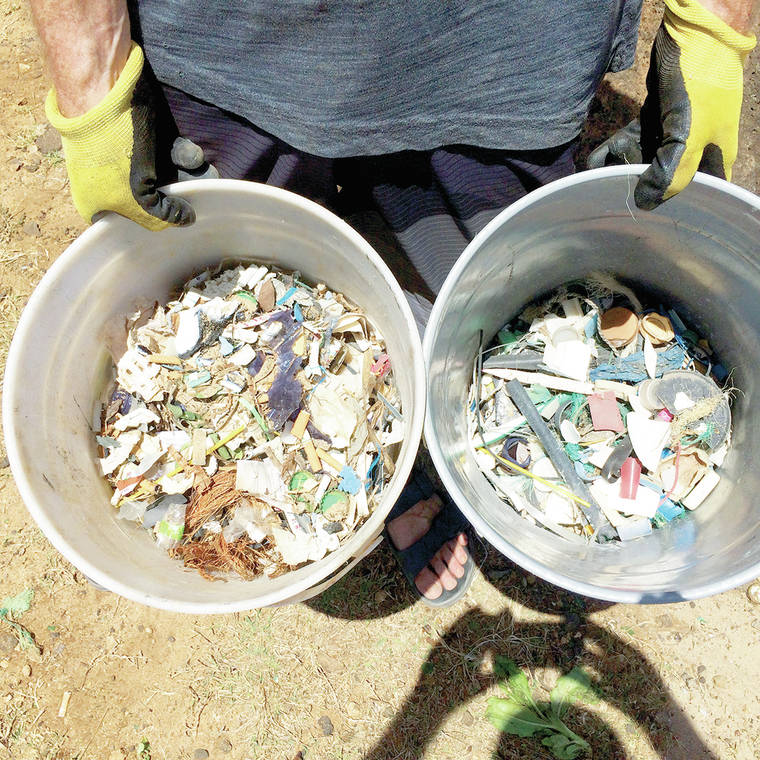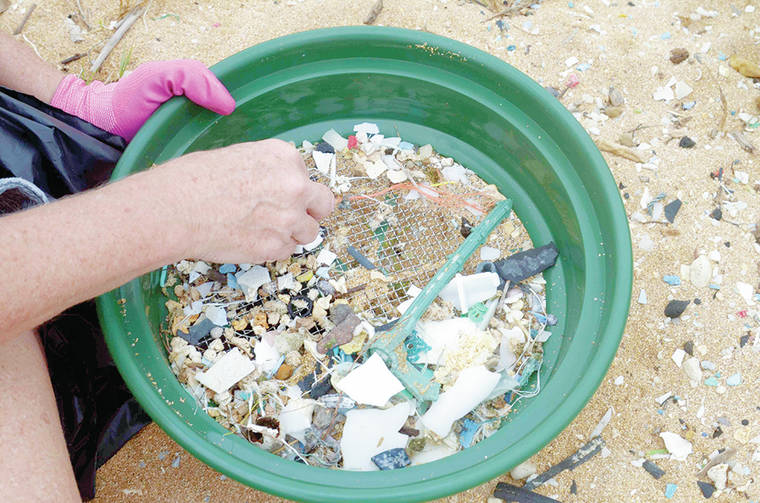LIHU‘E — Several environmental groups are taking a different approach to preventing plastic pollution in the ocean by taking the matter to court under the Clean Water Act.
The Kaua‘i Chapter of Surfrider Foundation is among the listed organizations that filed suit against the Trump Administration Wednesday for failing to protect 17 coastal water bodies around Hawaii from wide-scale plastic pollution.
The lawsuit challenges the Environmental Protection Agency’s “failure to examine studies showing widespread plastic pollution in Hawai‘i’s coastal waters and declare the waters ‘impaired’ under the Clean Water Act.”
The Clean Water Act requires EPA to designate as “impaired” all bodies of water that fail to meet state water quality standards. Once a water body is designated impaired, officials are required to take action to reduce the pollution.
And, according to those involved, it’s a landmark move.
“It is the first time that EPA is being asked to consider plastic as a pollutant that needs to be monitored and regulated,” said Carl Berg, senior scientist with Kaua‘i Surfrider Foundation.
Annually, Kaua‘i Surfrider Foundation works under a marine debris program grant through the National Oceanic and Atmospheric Administration, in partnership with Hawai‘i Wildlife Fund. Together, the two organizations collect more than 100 tons of plastic from Kaua‘i and Hawai‘i Island shorelines every year.
It comes in many forms, too, ranging from microplastics that contaminate the coastal waters and harm marine life, to massive piles of plastic at places like Kamilo Beach, or the plastic boat hull that’s stuck on the rocks on Kaua‘i’s Eastside.
Also adding their names to the lawsuit are organizations Center for Biological Diversity and Sustainable Coastlines Hawai‘i.
Rafael Bergstrom, executive director for Sustainable Coastlines Hawai‘i, said he and his team have witnessed the increasing threats of Hawaii’s plastic pollution epidemic firsthand.
“Every year, a denser wave of plastic makes its way into our coastal waters,” Bergstrom said. “This insidious pollution shows up as giant heaps of nets that strangle our endangered marine life and as microscopic fragments that are mistaken for food.”
Berg points out the Hawaiian åIslands “sieve out” the plastic from the Pacific Ocean, concentrating it into nearshore waters.
“Microplastics and the toxic chemicals that adhere to them are dangerous to marine life at all stages in their life cycle. Plastic should be considered a pollutant to all recreation waters and EPA should force polluters to stop putting public heath at risk,” Berg said.
According to the lawsuit, plaintiffs are requesting a declaration that EPA violated its duties under the Clean Water Act and an order requiring EPA to disapprove Hawai‘i’s list of impaired water bodies.
•••
Jessica Else, editor-inchief, can be reached at 245-0452 or jelse@thegardenisland.com.




Emptypeachment?? Victory or EGG on Dims Faces? Hillarious!
We drove our gas powered cars to the beach, put on our plastic slippas, grabbed our plastic buckets and filled them with more plastic. Took pictures with our toxic phones and blamed “them” for pollution.
some people clean up the beach, others just talk.
So, for a recap….you don’t like Trump because “He is mean”, and he created this problem?? Got it! SMH.
China and India produce the most plastic ocean pollution. Hawaii and the United States is very clean than most other Countries. Use your money to sue the bad guy polluters, and quit wasting our time sword fighting windmills! You being stupid.
Fun fact:
95% of ocean plastic comes from 8 rivers in Asia, 2 in Africa.
40% alone comes from the Yangste river.
Responsible use of plastics ain’t a problem.
In the US, we are responsible users.
What little litter we do is controllable.
We should burn our garbage, too.
We Americans, and mostdef we in Hawaii, ain’t the problem.
No way.
Want to stop ocean plastics?You gotta go to the 3rd world, you know…the $hithole countries, get them to stop trashing their communities, and the planet.
Of course, that’s just racist.
Meanwhile, teach our kids it’s all our fault.
That’s just the progressive-fascist eco-zealot way
Well said.
If you’re old enough you might remember when the Democratic party represented the working class. Where did we go wrong?
Just a thought… perhaps that is why China and other Asia countries no longer accept all that plastic waste back from the USA?
Almost all the pollutions and poisons on earth stem from mixing up and rearranging oil, petroleum, molecules into a zillion petrochemicals used for plastic, herbicide, pesticide, food additives, other Ag poisons, medicines, all this and more all made from petroleum, it is all carcinogenic, cancer causing, it’s so insane that after it gives you cancer, more petrochemicals are used in chemo therapy to kill the cancer that’s killing you…they call it science, it’s FAKE science since it’s purpose is for corporate and big biz profits, like Big Pharm. it started long before President Trump…and will go on after him.
I get your message. Plastic is a huge problem. But clearly not Trumps fault. This type of protest will only waste tax payer dollars and court resources on a frivolous law suit. The new generation of activists would rather complain and finger point then actually get out there and work. Go plant a tree, go clean a beach, or why don’t you try to sue China or India as they are the ones polluting our ocean. Empty activism won’t solve any problems just create more. Wake up you zombie Woke people!!